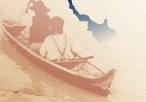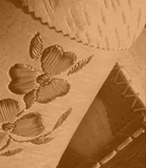Archaeologists and Aboriginal elders work closely together in the Northwest Territories, sharing their knowledge and expertise to help reconstruct the puzzle of the past. Living in a landscape that has remained unchanged for thousands of years, Aboriginal elders possess important knowledge about the history of their society and its interaction with the local environment. Through their own experience, and with the knowledge passed down through the generations, their traditional knowledge preserves information about a unique and complex human relationship with the land and other species inhabiting it.
Archaeologists, on the other hand, trained at university to recognize and interpret the remains left behind by past cultures, can reconstruct past life ways from these fragmentary finds. Archaeologists are like detectives, trying to reconstruct a puzzle for which most of the pieces have been lost. By working together in an atmosphere of respect and partnership, elders and archaeologists can learn from each other. By combining their experience, training, and knowledge, together they are often able to find new ways to understand the puzzle of the distant past.

